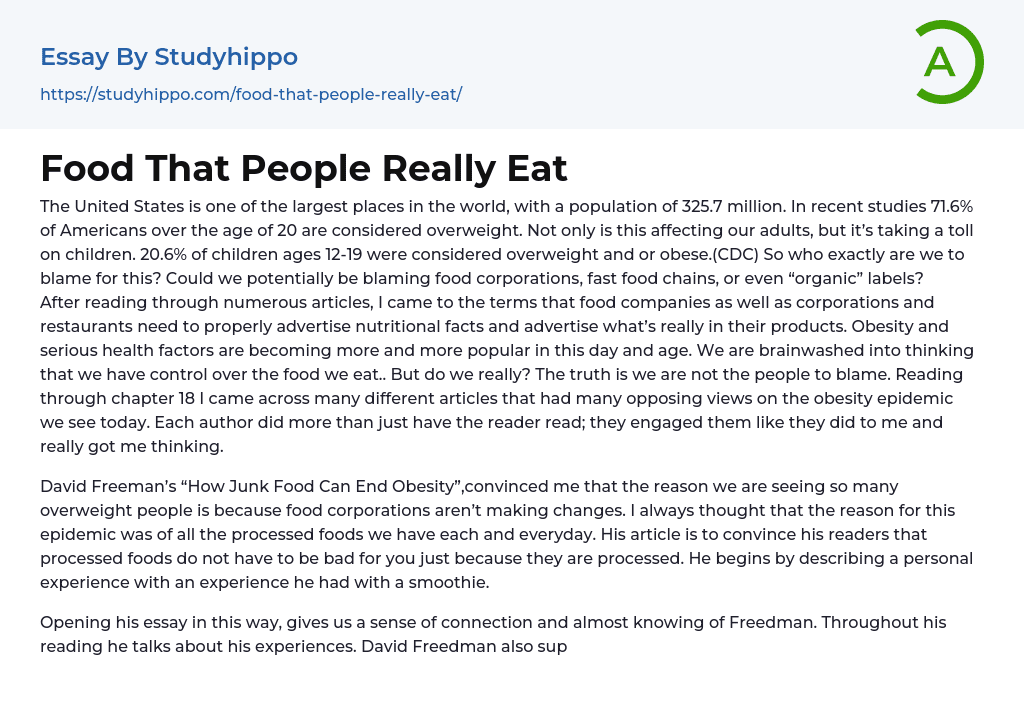Obesity and its associated health issues are becoming increasingly common in today's society. Despite the prevailing belief that we have control over our food choices, this may not always be accurate. We should not be held accountable for the current situation. During my study of chapter 18, I encountered numerous articles with contrasting perspectives on the obesity epidemic. These authors went beyond mere reading; they actively engaged readers, including myself, and encouraged critical thinking. One article that had a profound impact on me was David Freeman's "How Junk Food Can End Obesity." It convinced me that the main cause of the increase in overweight individuals is primarily attributed to a lack of action from food corporations.
The author challenges the common belief that processed foods are solely responsible for the epidemic. Instead, he aims to persuade readers that processed foods can still be beneficial. To support his argument, he shares a personal encounter with a smoothie, creating a sense of familiarity and connection with the readers.
Throughout his reading, David Freedman discusses his experiences and supports his criticism of Michael Pollan by comparing healthy foods versus junk foods. Freedman recounts an incident where he purchased "wholesome foods" only to discover that the meat labeled as "organic" and healthier actually contained more fat per ounce than a Big Mac from McDonald's. These personal experiences bolster
his article, as he gathered factual information on his own. So what should be done? Should we diet? Interestingly, Michael Pollan shares his beliefs in his writing, highlighting the numerous health risks associated with diets like the "Western Diet."
According to Michael Pollan, it is important to replace fatty foods with healthy fats. In his reading, he presents numerous important ideas supported by studies and actual facts. Pollan argues that a significant portion of Western food is processed and should be avoided. His stance is to eliminate the Western diet in the United States and encourage Americans to adopt healthier eating habits.
In his article, Pollan suggests that by adhering to his three messages - "Eat food. Not too much. Mostly plants" (Pollan 440) - we can reduce the number of people impacted by illness. I agree with this viewpoint as the Western diet poses a risk to our health and may become even more hazardous in the future. By substituting processed foods with healthier alternatives, we can safeguard ourselves from potential health issues in the future. Another piece that resonated with me was David Zinczenko's "Don't Blame The Eater".
Zinczenko presents an intriguing argument that children who consume fast food, like McDonald's, should not be blamed for their weight gain and should have the right to sue the fast food industry for contributing to their obesity. This idea surprised me. How could suing fast food companies actually make a difference? According to Zinczenko, these companies are promoting an unhealthy product to children without sufficient warning labels. He suggests that they should protect themselves and their customers by providing nutrition information so people can make informed choices. Without
these warnings, more children will become sick and obese, leading to unhappy parents and potential lawsuits. Personally, I support Zinczenko's goals; however, I believe he should focus on implementing stricter labeling regulations rather than resorting to litigation.
In the United States, the government does not mandatorily require the inclusion of calorie information on fast-food packaging in accordance with food and Drug Administration labeling laws. Interestingly, Steven Shapin's article "What Are You Buying When You Buy Organic?" raises a crucial inquiry regarding organic foods. Are we truly certain that a product is organic simply because it is found in the organic section? Shapin discusses his perspectives on the potential positive and negative consequences of consuming organic food. One quote that particularly caught my attention was when Shapin stated, "It all depends on what you think you're buying when you buy organic. If the word evokes an image of a small, locally-owned family business, you may end up being disappointed." Opting for organic food is undeniably a commendable step towards sustainable practices.
Opting for organic produce offers a range of advantages, including the promotion of healthier food options, the reduction of medical issues, and support for local farms. These benefits underscore the considerable influence of choosing organic. Shapin's viewpoint on this subject prompts contemplation as it casts doubt on the genuineness of food labeled as "organic." To tackle these concerns, stricter regulations should be enforced to guarantee precise labeling and provision of nutritional details for all food products.
Being aware of the origin of a product increases the likelihood of purchasing it. This is why I personally choose to buy locally and avoid supporting large grocery stores. Additionally, I actively
cultivate my own vegetables and herbs.
All these essays share a common theme: discussing various health risks and concerns that impact us. Whether it's adopting organic food like Shapin suggests, avoiding fatty foods, or eliminating fast food from our diets, we need to become more conscious.
If we desire long and happy lives, reconsideration of certain foods – even if they are convenient and cheaper – is necessary. By enhancing our daily diets, we will experience long-term benefits that positively affect both our bodies and overall health.
It is never too late to begin eating healthily and making changes - even small adjustments in our diets can lead to significant improvements!


Unfortunately copying the content is not possible
Tell us your email address and we’ll send this sample there.
By continuing, you agree to our Terms and Conditions.


